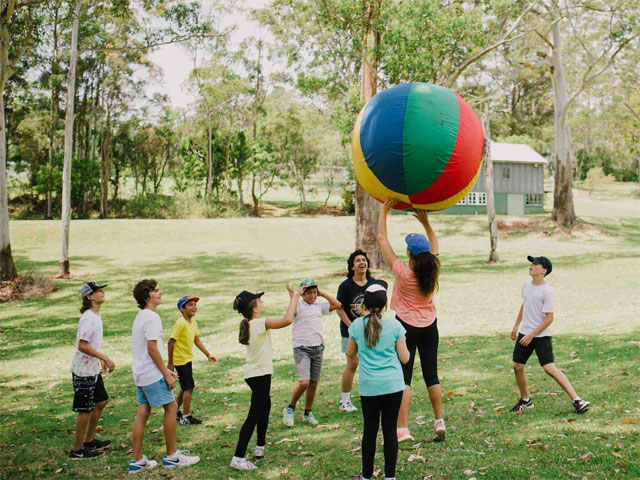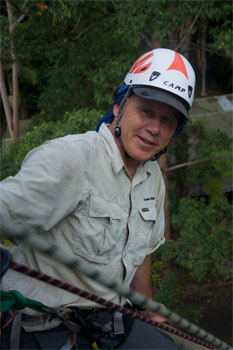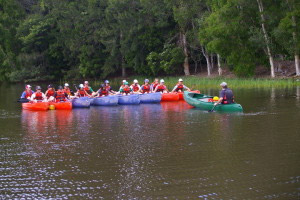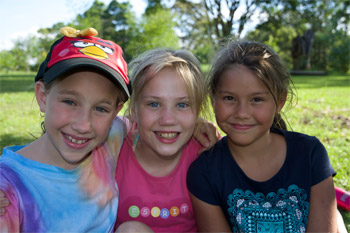Andrew Grant Outdoor Education Boost for Sunshine Coast Interview

Andrew Grant Outdoor Education Boost for Sunshine Coast Interview
As the tourism sector winds down after another busy summer the Sunshine Coast's camping industry is launching into its busiest time of year. Staff of the Queensland Conference and Camping Centre (QCCC) at Mapleton has spent the summer updating their training and qualifications and to ensure the region continues maintains its reputation as the "go-to" destination for school camps. The region's outdoor education facilities cater to an estimated 200,000 guests annually, including interstate and international groups.
Like many campsites on the Coast the focus at QCCC Mapleton is on Outdoor Education, with up to 16 instructors employed during the busiest periods. A visit to the campsite, particularly on a weekday, reveals a hive of activity and learning"children skittering around the canoe lake, clambering up the immense climbing wall, descending off the abseil tower, racing around map-reading and orienteering, firing arrows at targets, clouded in woodsmoke at the bush skills hut or swooshing through the air on the giant swings, flying foxes, leap of faith and glider possum.
The 35-acre property includes a remnant of old-growth rainforest nestled around Baxter Creek. Two years ago the site commenced a long-term plan to restore this area to its full glory in a way that engages visiting school students. The rainforest is already an important part of the site's environmental activities, combining a reflective walk through the rainforest with a visit to the onsite Nature Display, an amazing private collection of butterflies, insects and shells.
Over the last few years the site has introduced several new activities complementary to the Australian Curriculum. "It's an ambitious attempt to keep up with the big changes in schools and education following the introduction of the new Australian Curriculum," says Director of QCCC, Andrew Grant. "These seven activities are purpose-built to help students have a memorable outdoor experience of the things they learn in their classrooms back at school. "
The activities are team-building and problem-solving exercises focused on the three cross-curriculum priorities"Aboriginal history and culture, Australia's connection with Asia and environmental sustainability. They include indigenous art workshops, a bushwalk and cultural awareness activity led by the local Gubbi Gubbi people, two activities focused on the Eureka Stockade, a sequential activity looking at successive migrant arrivals and the boat people issue and a problem-solving game focused on the legends and larrikins of the 19th century.
Andrew Grant describes another exercise, called Van Diemen's Land, to explain how students will be immersed into the story in each activity. "Van Diemen's Land is all about the Convict Transportation System. The kids will sneak down to the canoe lake, stealing the items they need to build a raft. They'll be slapped in irons for their thieving before working together to build their raft which they'll sail across to an island in the lake. Once there, they will have a brief reflective exercise on what it must have been like to arrive on the shores of Australia with nothing of what they would have viewed as infrastructure. Finally they have to cooperate with the Governor to earn their pardons in a team-building game."
In attendance numbers, QCCC Mapleton ranks as one of the Blackall Range's major visitor attractions. Several times a week busloads of children ply their way up and down the mountain from all over the State. Visitors arrive by the carload for the weekends. The initiative to tie camping with the Australian Curriculum will raise the Sunshine Coast's profile as a leading destination for Outdoor Education.
 "Is there a better place in the world for quality Outdoor Education than the Blackall Range?" asks Andrew Grant.
"Is there a better place in the world for quality Outdoor Education than the Blackall Range?" asks Andrew Grant.
Winner of the 2013 QORF Award for Excellence in Outdoor Education, QCCC Mapleton is one of the largest and most sought-after camping and school camp venues in Queensland. Employing 65 locals, the site hosts more than 200 schools each year, some travelling from as far away as Japan, China, Central and North Queensland and northern NSW. In total, more than 30,000 guests visit the site each year with weekends and school holidays booked out by craft retreats, orchestral groups, church camps and charity organisations like Camp Diabetes, Canteen, Scripture Union and others. Big groups are welcomed"there are several large Conventions booked for 2015.
Interview with Andrew Grant
Question: What is the Queensland Conference and Camping Centre?
Andrew Grant: a Queensland Conference and Camping Centres (QCCC) is one of Queensland's leading providers of school camps, outdoor education, leadership retreats, church events, expeditions and conference facilities. It operates three venues on the Gold Coast, Sunshine Coast and in Brisbane with a combined total of 750 beds. It also has a growing offsite program incorporating journey-based expeditions programs in Moreton Bay, the Mary Valley, Glasshouse region and Northern NSW.
Question: Why is it important that staff continually update their training?
Question: Can you talk us through the staffs training and qualifications?
Andrew Grant: Running a campsite is a multi-faceted and multi-layered undertaking. It's like a combination of a hotel, a school and a theme park, run on a budget. Not only do we have to have to train across several activities, we also need staff who are all-rounders/multi-skilled. The kitchens at each site have several chefs overseeing catering departments which serve out more than 200,000 meals annually including the provision of special diets. In the Outdoor Education Department there is a constant pressure to not only maintain current skills but update them to keep our programs innovative and growing.
Question: What's different about the Queensland Conference and Camping Centre?
Andrew Grant: I don't know if we're different to other outdoor education centres, it might just be that our industry is a bit different to many others. Probably because we spend so much time facilitating team-building and fostering relationships amongst our guests, the industry itself has a similar approach. We don't really talk about other sites being competitors, we'd rather see them as collaborators. Ultimately if kids are having a great time in the outdoors society as a whole benefits. Probably the most common feedback we get from guests at our sites will run along the lines of "they bend over backwards to help your program" or "your staff can't do enough to help". I hope that's reflective of the high premium we place on excellence in service, which is only really possible if you really believe in what you're doing.
 Question: Why is it important to focus on Outdoor Education?
Question: Why is it important to focus on Outdoor Education?
Andrew Grant: In recent years researchers have started to talk about Nature Deficit Disorder (Richard Louv leads the thinking in this area). Backyards are getting smaller, child safety concerns have kids on a shorter leash and open spaces can even be seen as 'scary' places. The outdoor education industry is determined to make sure kids don't lose touch with their environment, because if the next generation don't value it, how will they ever be good custodians of it? The thing I like about this job is the palpable sense of excitement that spills out of the buses every few days. Most kids get so excited about camp and they can't wait to get there, and our sites, being all nature-based, can sometimes seem a universe away for city kids. You can't better the sense of wonder kids have and they throw themselves into camp with a wild abandon. Schools do camp because you can achieve so much in just a few days away – build relationships, weld together year groups and have kids learn in very different ways to the classroom.
Question: How do school camps complement in-classroom education?
Andrew Grant: While I went okay at school and in traditional education, when I look back on my time at school the most vivid times of learning for me were when we were doing things which were memorable and out of the ordinary. For instance in Grade 7 our teacher cleared out the classroom, dumped a table tennis table into the middle and made us create a "city" with paper mache. For a whole term we then proceeded to play a "game of life" and all of our learning took place in the context of that game. I can't overstate how formative this term was in my life and education and this has probably flowed into the way we approach things in our camping programs.
We introduced activities which aligned with the National Curriculum because we could see demand for that is going to grow. It also means camp has the potential to add to classroom teaching, rather than seen as a way to take away from it. Our aim with the activities which reference the National Curriculum activities is fairly simple. They're pitched at students who might not have great reading or classroom retention but will be able to think back to their camp experience and connect some information with something they did and be able to answer an exam questions because of it.
Question: What activities do guests participle in?
Andrew Grant: QCCC Brookfield is the closest school campsite to Brisbane's CBD and we call it our Urban Campus as it specialises in programming for groups accessing the historical and political curriculum of Brisbane. It's also very highly sought after for music camps and leadership retreats because it has 14 meeting rooms. At QCCC Mapleton and Tamborine we specialise in Outdoor Education and Retreats. Both sites have around 25 activity options including high ropes elements including Giant Swing, Flying Fox, Abseiling, Climbing Wall. Back at ground level there's orienteering, low-ropes and canoeing. Mapleton also has several activities aligned with the National Curriculum – two Eureka Stockade themed activities (ideal for the Grade 5 curriculum), Van Diemen's Land (Convict Transportation) and two activities fully operated by the local aboriginal people, the Gubbi Gubbi nation.
Question: Why do you find you are so appealing to interstate and international groups?
Andrew Grant: I think we probably have an unfair advantage over most areas in South East Queensland. We have a major international airport and a climate conducive to being in the outdoors all year around. We run expeditions for Victorian schools in Moreton Bay in the height of the Victorian winter and for international groups looking for programming in the northern summer the mild Queensland winter is attractive. We also have sensational natural assets. Our two Hinterland Campsites are nestled in rainforest with the beach just a short drive away. When it comes to our expeditions programs we're fortunate to have some remarkable journeys. Moreton Bay is a pristine and quiet area despite being adjacent to a major world city. The Mary Valley is a hidden and little explore gem and the Glasshouse has its heritage-listed mountains glowering over the calm waters of the Pumistone Passage.
Question: What's next for the Queensland Conference and Camping Centre?
Andrew Grant: Our main growth looks like it will come from our journey-based expeditions. We trialled a sequential program with a Girls' School in 2014 and it was well-received. They're good to go again this year and we have several other all-girls schools locking in expeditions in 2016. We're also on the verge of finalising a lease arrangement with a neighbour at Mount Tamborine which will give us 35 acres of stunning land, overlooking Brisbane and Moreton Bay, for outdoor education.
Interview by Brooke Hunter
MORE




